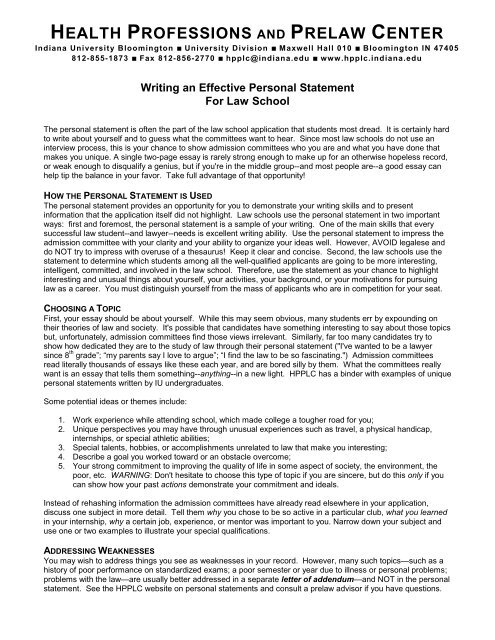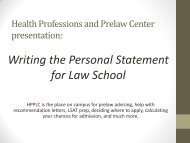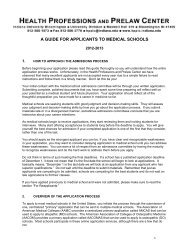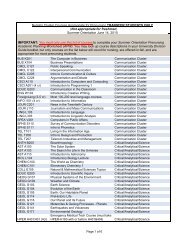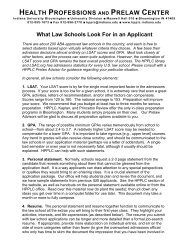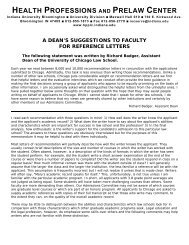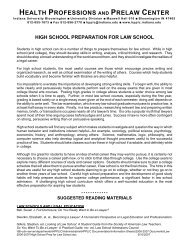Writing an Effective Personal Statement for Law School - Health ...
Writing an Effective Personal Statement for Law School - Health ...
Writing an Effective Personal Statement for Law School - Health ...
Create successful ePaper yourself
Turn your PDF publications into a flip-book with our unique Google optimized e-Paper software.
HEALTH PROFESSIONS AND PRELAW CENTER<br />
Indi<strong>an</strong>a University Bloomington ■ University Division ■ Maxwell Hall 010 ■ Bloomington IN 47405<br />
812-855-1873 ■ Fax 812-856-2770 ■ hpplc@indi<strong>an</strong>a.edu ■ www.hpplc.indi<strong>an</strong>a.edu<br />
<strong>Writing</strong> <strong>an</strong> <strong>Effective</strong> <strong>Personal</strong> <strong>Statement</strong><br />
For <strong>Law</strong> <strong>School</strong><br />
The personal statement is often the part of the law school application that students most dread. It is certainly hard<br />
to write about yourself <strong>an</strong>d to guess what the committees w<strong>an</strong>t to hear. Since most law schools do not use <strong>an</strong><br />
interview process, this is your ch<strong>an</strong>ce to show admission committees who you are <strong>an</strong>d what you have done that<br />
makes you unique. A single two-page essay is rarely strong enough to make up <strong>for</strong> <strong>an</strong> otherwise hopeless record,<br />
or weak enough to disqualify a genius, but if you're in the middle group--<strong>an</strong>d most people are--a good essay c<strong>an</strong><br />
help tip the bal<strong>an</strong>ce in your favor. Take full adv<strong>an</strong>tage of that opportunity!<br />
HOW THE PERSONAL STATEMENT IS USED<br />
The personal statement provides <strong>an</strong> opportunity <strong>for</strong> you to demonstrate your writing skills <strong>an</strong>d to present<br />
in<strong>for</strong>mation that the application itself did not highlight. <strong>Law</strong> schools use the personal statement in two import<strong>an</strong>t<br />
ways: first <strong>an</strong>d <strong>for</strong>emost, the personal statement is a sample of your writing. One of the main skills that every<br />
successful law student--<strong>an</strong>d lawyer--needs is excellent writing ability. Use the personal statement to impress the<br />
admission committee with your clarity <strong>an</strong>d your ability to org<strong>an</strong>ize your ideas well. However, AVOID legalese <strong>an</strong>d<br />
do NOT try to impress with overuse of a thesaurus! Keep it clear <strong>an</strong>d concise. Second, the law schools use the<br />
statement to determine which students among all the well-qualified applic<strong>an</strong>ts are going to be more interesting,<br />
intelligent, committed, <strong>an</strong>d involved in the law school. There<strong>for</strong>e, use the statement as your ch<strong>an</strong>ce to highlight<br />
interesting <strong>an</strong>d unusual things about yourself, your activities, your background, or your motivations <strong>for</strong> pursuing<br />
law as a career. You must distinguish yourself from the mass of applic<strong>an</strong>ts who are in competition <strong>for</strong> your seat.<br />
CHOOSING A TOPIC<br />
First, your essay should be about yourself. While this may seem obvious, m<strong>an</strong>y students err by expounding on<br />
their theories of law <strong>an</strong>d society. It's possible that c<strong>an</strong>didates have something interesting to say about those topics<br />
but, un<strong>for</strong>tunately, admission committees find those views irrelev<strong>an</strong>t. Similarly, far too m<strong>an</strong>y c<strong>an</strong>didates try to<br />
show how dedicated they are to the study of law through their personal statement ("I've w<strong>an</strong>ted to be a lawyer<br />
since 8 th grade”; “my parents say I love to argue”; “I find the law to be so fascinating.") Admission committees<br />
read literally thous<strong>an</strong>ds of essays like these each year, <strong>an</strong>d are bored silly by them. What the committees really<br />
w<strong>an</strong>t is <strong>an</strong> essay that tells them something--<strong>an</strong>ything--in a new light. HPPLC has a binder with examples of unique<br />
personal statements written by IU undergraduates.<br />
Some potential ideas or themes include:<br />
1. Work experience while attending school, which made college a tougher road <strong>for</strong> you;<br />
2. Unique perspectives you may have through unusual experiences such as travel, a physical h<strong>an</strong>dicap,<br />
internships, or special athletic abilities;<br />
3. Special talents, hobbies, or accomplishments unrelated to law that make you interesting;<br />
4. Describe a goal you worked toward or <strong>an</strong> obstacle overcome;<br />
5. Your strong commitment to improving the quality of life in some aspect of society, the environment, the<br />
poor, etc. WARNING: Don't hesitate to choose this type of topic if you are sincere, but do this only if you<br />
c<strong>an</strong> show how your past actions demonstrate your commitment <strong>an</strong>d ideals.<br />
Instead of rehashing in<strong>for</strong>mation the admission committees have already read elsewhere in your application,<br />
discuss one subject in more detail. Tell them why you chose to be so active in a particular club, what you learned<br />
in your internship, why a certain job, experience, or mentor was import<strong>an</strong>t to you. Narrow down your subject <strong>an</strong>d<br />
use one or two examples to illustrate your special qualifications.<br />
ADDRESSING WEAKNESSES<br />
You may wish to address things you see as weaknesses in your record. However, m<strong>an</strong>y such topics—such as a<br />
history of poor per<strong>for</strong>m<strong>an</strong>ce on st<strong>an</strong>dardized exams; a poor semester or year due to illness or personal problems;<br />
problems with the law—are usually better addressed in a separate letter of addendum—<strong>an</strong>d NOT in the personal<br />
statement. See the HPPLC website on personal statements <strong>an</strong>d consult a prelaw advisor if you have questions.
STYLE AND FORMAT<br />
Some law schools will set a page or word limit on the length of the personal statement. If they don't, a good<br />
guideline is two to three typewritten, double-spaced pages. A long dissertation will not impress <strong>an</strong> overworked<br />
admissions officer. A few words over the limit are fine, but don't write three extra pages. Make sure that the<br />
typeface, the margins, <strong>an</strong>d the paragraphing of the statement make it attractive <strong>an</strong>d inviting to read.<br />
Begin with something that grabs their attention—remember that m<strong>an</strong>y officials will read 20-30 personal statements<br />
at one sitting. Then be sure to hold their attention as well. For more detailed tips, see the personal statement<br />
material in the prelaw section of the HPPLC website.<br />
Remember the import<strong>an</strong>ce of showing your writing ability. Keep the statement short, concise, <strong>an</strong>d clear. Avoid<br />
the temptation to use what might seem like "lawyerly" l<strong>an</strong>guage; it sounds pretentious. Good lawyers don't use a<br />
lot of words like "whereas" <strong>an</strong>d "hereby," <strong>an</strong>yway.<br />
Use your creativity in coming up with a topic about yourself that is interesting, choosing descriptive words, <strong>an</strong>d<br />
designing clear sentences. In general, it is a bad idea to devise <strong>an</strong> unusual <strong>for</strong>mat, such as a mini-play or<br />
dialogue or to pretend to argue your case <strong>for</strong> admission to a mythical court or jury. If you're dying to try something<br />
creative, give it a shot. Show it to a number of people to get their impression. If their reaction is "because I know<br />
you, it makes sense," don't use it. Remember that the statement provides everything the admission committee will<br />
know about you; your statement must st<strong>an</strong>d-alone. Too much "creativity" in <strong>for</strong>mat c<strong>an</strong> leave a committee still<br />
wondering who you are.<br />
EXTRA HINTS<br />
1. When discussing special activities or employment, don't simply say, <strong>for</strong> example, "I was a two-year member of<br />
IUSA." Admission committees may not be able to figure out what <strong>an</strong> activity or group is. Explain what the<br />
activity is, describe your role, <strong>an</strong>d tell why it has been import<strong>an</strong>t to you. Don't merely list your activities again in<br />
the personal statement (a prose resume)--be exact <strong>an</strong>d descriptive, telling about your unique contribution to<br />
the group.<br />
2. When writing, outline the statement, write it, then rewrite it--several times. Put it aside <strong>an</strong>d look at it again with<br />
fresh eyes. Strive to develop a statement that is coherent <strong>an</strong>d flows from one sentence to the next. This will<br />
involve more th<strong>an</strong> one weekend of work!<br />
3. Proofread carefully. Lapses in grammar or syntax create doubt about your ability to write well, <strong>an</strong>d errors in<br />
typing or spelling reflect poorly on your attention to detail. Don't rely on spell-check alone!<br />
4. Ask several people to look over your personal statement <strong>for</strong> editing <strong>an</strong>d opinions about style <strong>an</strong>d message.<br />
Make sure a trusted friend or teacher agrees that your statement says something helpful about you, <strong>an</strong>d<br />
conveys the message you w<strong>an</strong>t to send. Additionally, try to show the statement to people who don't know you<br />
so well, as that will more closely follow what will happen in the admission process.<br />
You may w<strong>an</strong>t to use the <strong>Writing</strong> Tutorial Services in Ball<strong>an</strong>tine Hall <strong>for</strong> editing advice. Also, remember that<br />
the prelaw advisors are here to help! While we c<strong>an</strong>not edit the statement <strong>for</strong> you, feel free to bring it in <strong>for</strong> a<br />
second (or third) opinion. When making <strong>an</strong> appointment to go over your personal statement with the prelaw<br />
advisor, try to bring a draft to the office a day or so be<strong>for</strong>e the appointment, or send it as <strong>an</strong> email attachment,<br />
so the advisor c<strong>an</strong> read over it <strong>an</strong>d make notes be<strong>for</strong>e you come in. See also, links to “<strong>Writing</strong> a <strong>Personal</strong><br />
<strong>Statement</strong>” at the “<strong>Law</strong>” Career Interest Area of our website.<br />
You may use e-mail to ask questions <strong>an</strong>d communicate with advisors, by sending it to: udivhpp@indi<strong>an</strong>a.edu. All<br />
correspondence regarding your recommendation file should be sent to recserve@indi<strong>an</strong>a.edu. Visit HPPLC's web<br />
site to see notices of upcoming meetings, campus visitations, <strong>an</strong>d other items of interest. To access the HPPLC<br />
pages, visit: www.hpplc.indi<strong>an</strong>a.edu.<br />
This document has been prepared <strong>for</strong> Indi<strong>an</strong>a University - Bloomington students by the <strong>Health</strong> Professions <strong>an</strong>d Prelaw Center. Please note<br />
that specific requirements <strong>an</strong>d policies c<strong>an</strong> ch<strong>an</strong>ge at <strong>an</strong>y time without notice. Students are responsible <strong>for</strong> obtaining the most current<br />
in<strong>for</strong>mation directly from the application services, schools, <strong>an</strong>d programs in which they have <strong>an</strong> interest.


